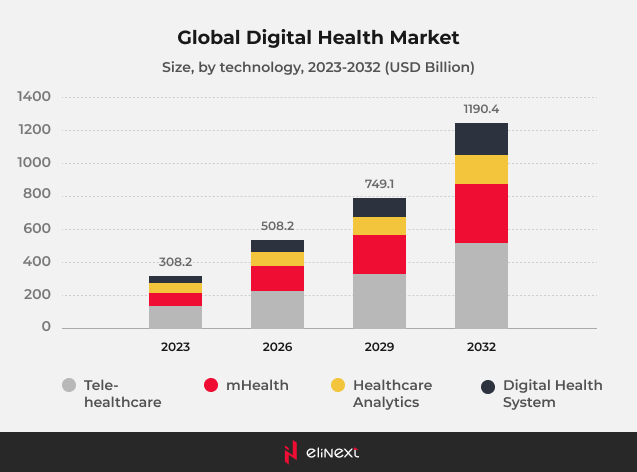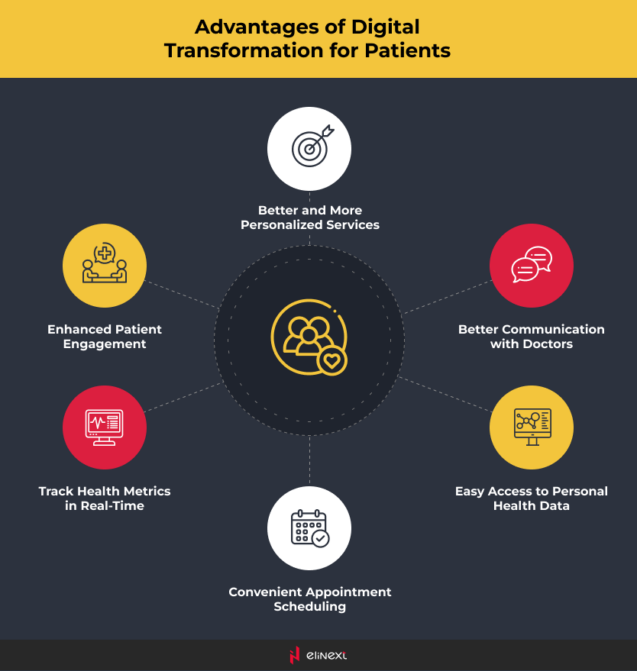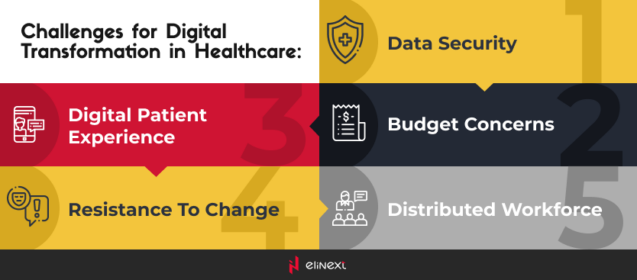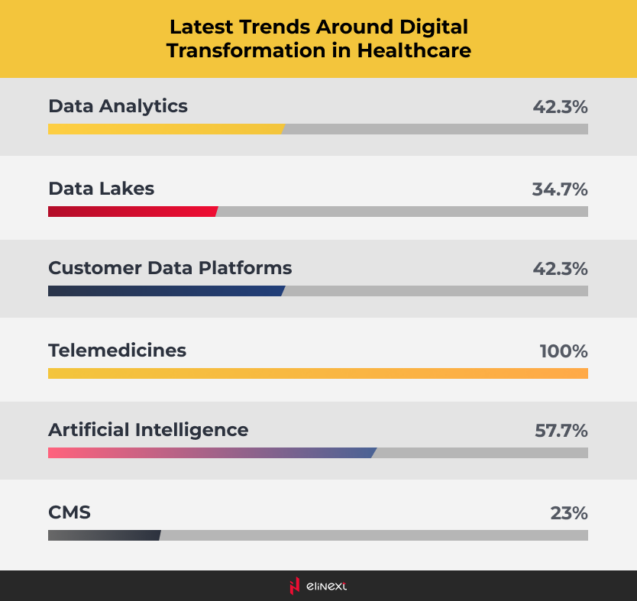Digital transformation in healthcare integrates technology to improve care delivery, automate some operations, relieve the workload of health professionals, and ultimately improve patient outcomes. With a market driven by mHealth, tele-healthcare, healthcare analytics solutions, and Digital Health System, healthcare digital transformation trends like personalized medicine, data-driven insights, and remote monitoring are reshaping the industry, ensuring better access and efficiency in patient care.
What is a digital transformation for the healthcare industry?
Digital transformation in healthcare is the use of technology to improve medical care and the operations that support it. Examples of digital transformation in healthcare include tools like electronic health records, telemedicine, AI, and wearable devices, making healthcare faster, more accurate, and more accessible. These innovations have transformed the industry by replacing paper records, enabling real-time health monitoring, providing remote care, and achieving diagnostics that rival human expertise.
Healthcare digital transformation services by Elinext
Artificial Intelligence (AI)
AI solutions and ML solutions in healthcare help improve diagnosis, predict patient outcomes, and personalize treatment plans through data analysis, machine learning algorithms, and neural networks.
Telemedicine
Telemedicine allows remote consultations between patients and healthcare providers with secure digital platforms for real-time remote consultations.
Internet of Things (IoT)
IoT connects medical devices and sensors to collect real-time data, enabling better continuous patient monitoring, data aggregation, and analytics.
Big Data
Big data in healthcare uses advanced analytics to process massive datasets, uncover actionable insights, optimize resource allocation, and support evidence-based clinical decision-making.
Virtual Reality (VR)
VR is used in healthcare for training, simulations, and pain management, offering immersive experiences that improve medical education and patient therapy.
Streamline medical workflows with tailored healthcare software development solutions by Elinext. Get in touch.
Benefits of digital transformation in healthcare
Digital transformation is changing healthcare step by step. It introduces advanced technologies that improve treatment efficiency, reduce spending, and make healthcare more accessible and personalized. These are just some of the benefits of digital transformation in healthcare.
Improved interaction
Digital tools improve communication between patients and healthcare providers. Patients receive help and support quickly and from any geographical location.
Robust database
Centralized electronic health records is one of the most celebrated examples of digital transformation in healthcare. EHR reduces time spent on paperwork and provides secure, organized, and easy access to patient data.
Reduced costs
Automation and efficient processes lower administrative expenses and reduce unnecessary medical interventions.
Effective communication
Secure digital platforms facilitate real-time collaboration among healthcare teams, improving care coordination.
Improved monitoring
IoT devices, remote tracking systems, and patient management solutions allow continuous health monitoring for better management of chronic conditions.
More convenience
Telemedicine, mHealth app development, and healthcare digital transformation services let patients access care from home, saving time and effort.
Easy access
Digital records and platforms ensure quick and reliable access to medical histories and services for both patients and healthcare providers.
Personalized experience
AI and data analytics enable tailored treatments and care plans based on individual patient needs.
Challenges of implementing digital transformation in healthcare
Patient data security
Ensuring robust cybersecurity measures is critical to protect sensitive patient information from breaches and unauthorized access.
Resistance to change
Adopting new technologies often faces resistance from staff due to a lack of familiarity or concerns about disrupting established workflows.
Budget or costing
Implementing digital solutions requires significant investment, which can be challenging for organizations with limited financial resources.
Distributed workforce
Managing remote teams and ensuring seamless collaboration demands advanced tools and secure, scalable communication platforms.
HIPAA and other compliances
Healthcare organizations must meet stringent regulations like HIPAA to safeguard patient data and maintain compliance with legal standards.
Why choose Elinext for digital transformation in healthcare?
With 27+ years of experience and over 1000 delivered projects, Elinext provides tailored healthcare solutions for every challenge. Our developers focus on innovation, compliance, and customer satisfaction, and work with you to create technology that’s perfect for your needs.
- Custom software development
- Technology expertise
- Consulting and strategy
- Agile methodology
- Quality assurance
-
Post-deployment support
See how Elinext can help you achieve digital transformation in healthcare industry. Get in touch.
Future of digital transformation in healthcare industry
AI and ML adoption
The integration of Artificial Intelligence and Machine Learning enables advanced algorithms for predictive analytics, anomaly detection, image recognition, and decision support systems, driving innovation in diagnostics, treatment, and operations.
Real-time data analytics
Real-time analytics processes data as it’s created, giving healthcare providers instant insights to make quick decisions and respond faster.
Adoption of data lakes
Data lakes provide scalable storage for structured and unstructured data, supporting advanced analytics, AI model training, and cross-platform interoperability in healthcare.
CMS adoption
Content Management Systems centralize digital asset management. They ensure seamless content delivery, regulatory compliance, and improved user experience through modular and scalable frameworks.
Customer data platform development
CDPs consolidate patient data from disparate sources into a unified repository, enabling advanced segmentation, predictive modeling, and personalized care strategies.
Conclusion
Digital transformation in healthcare industry with advancements like AI, real-time analytics, and IoT enables smarter, faster, and more personalized care for everyone. Custom healthcare software development of tools like data lakes, CMS, and CDPs can enhance patient care and simplify the work of health professionals. By adopting these innovations, healthcare organizations can overcome challenges, reduce costs, and deliver better outcomes, shaping a more accessible and connected future.
FAQ
1. What is digital transformation in healthcare?
Digital transformation in healthcare is the use of advanced technology like Artificial Intelligence and Machine Learning solutions, mHealth solutions, IoT, and telemedicine to improve patient care and access to care, as well as simplify the work of health professionals.
2. Why is digital transformation for healthcare so important?
Digital transformation for healthcare improves medical care quality, increases the precision of diagnosis, reduces costs of healthcare, and enables better access for patients from remote areas.
3. How does digital transformation benefit patients?
Healthcare digital transformation offers personalized care for patients, faster medical services, remote access for patients via telemedicine, real-time health monitoring for chronic conditions, and improved treatment outcomes for areas where analytics solutions can benefit the results.
4. How does AI impact digital transformation in healthcare?
AI is one of the most prominent healthcare digital transformation trends. AI powers predictive analytics in healthcare, automates diagnostics, and improves decision-making for health professionals.
Related Cases
Real-Time Fertility Lab Monitoring Project
Web App for IoT Devices Monitoring
Mobile Application for Brain Data Monitoring with BLE Device













